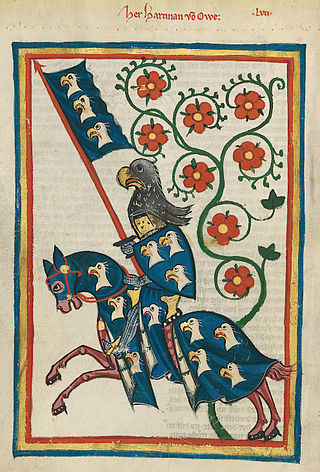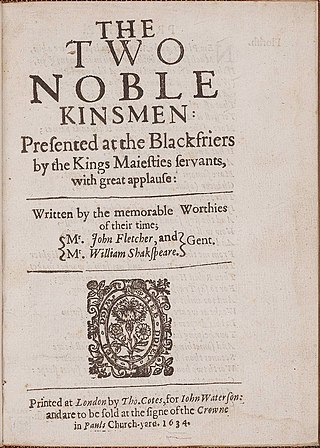
A knight is a person granted an honorary title of knighthood by a head of state or representative for service to the monarch, the church or the country, especially in a military capacity.

The Raigne of King Edward the Third, often shortened to Edward III, is an Elizabethan play printed anonymously in 1596, and at least partly written by William Shakespeare. It began to be included in publications of the complete works of Shakespeare only in the late 1990s. Scholars who have supported this attribution include Jonathan Bate, Edward Capell, Eliot Slater, Eric Sams, Giorgio Melchiori and Brian Vickers. The play's co-author remains the subject of debate: suggestions have included Thomas Kyd, Christopher Marlowe, Michael Drayton, Thomas Nashe and George Peele.

Philip Massinger was an English dramatist. His finely plotted plays, including A New Way to Pay Old Debts, The City Madam, and The Roman Actor, are noted for their satire and realism, and their political and social themes.
This article contains information about the literary events and publications of 1623.

The Two Noble Kinsmen is a Jacobean tragicomedy, first published in 1634 and attributed jointly to John Fletcher and William Shakespeare. Its plot derives from "The Knight's Tale" in Geoffrey Chaucer's The Canterbury Tales, which had already been dramatised at least twice before, and itself was a shortened version of Boccaccio's epic poem Teseida. This play is believed to have been originally performed in 1613–1614, making it William Shakespeare's final play before he retired to Stratford-upon-Avon, where he died in 1616.

Twelfth Night, or What You Will is a romantic comedy by William Shakespeare, believed to have been written around 1601–1602 as a Twelfth Night entertainment for the close of the Christmas season. The play centres on the twins Viola and Sebastian, who are separated in a shipwreck. Viola falls in love with the Duke Orsino, who in turn is in love with Countess Olivia. Upon meeting Viola, Countess Olivia falls in love with her, thinking she is a man.

A New Way to Pay Old Debts is an English Renaissance drama, the most popular play by Philip Massinger. Its central character, Sir Giles Over-reach, became one of the more popular villains on English and American stages through the 19th century.

John Fletcher was an English playwright. Following William Shakespeare as house playwright for the King's Men, he was among the most prolific and influential dramatists of his day; during his lifetime and in the Stuart Restoration, his fame rivalled Shakespeare's. Fletcher collaborated in writing plays, chiefly with Francis Beaumont or Philip Massinger, but also with Shakespeare and others.

John Warburton (1682–1759) was an antiquarian, cartographer, and Somerset Herald of Arms in Ordinary at the College of Arms in the early 18th century.
Believe as You List is a Caroline era tragedy by Philip Massinger, famous as a case of theatrical censorship.

The Roman Actor is a Caroline era stage play, a tragedy written by Philip Massinger. It was first performed in 1626, and first published in 1629. A number of critics have agreed with its author, and judged it one of Massinger's best plays.
The Beaumont and Fletcher folios are two large folio collections of the stage plays of John Fletcher and his collaborators. The first was issued in 1647, and the second in 1679. The two collections were important in preserving many works of English Renaissance drama.
A Very Woman, or The Prince of Tarent is an early seventeenth-century stage play, a tragicomedy written by Philip Massinger and John Fletcher. It was first published in 1655, fifteen and thirty years after the deaths of its authors.
The Picture is a Caroline era stage play, a tragicomedy written by Philip Massinger, and first published in 1630.

The Maid of Honour is a Jacobean era stage play, a tragicomedy written by Philip Massinger, first published in 1632. It may be Massinger's earliest extant solo work.

The False One is a late Jacobean stage play by John Fletcher and Philip Massinger, though formerly placed in the Beaumont and Fletcher canon. It was first published in the first Beaumont and Fletcher folio of 1647.

William Shakespeare (1564–1616) was an English poet and playwright. He wrote approximately 39 plays and 154 sonnets, as well as a variety of other poems.
Edward Knight was the prompter of the King's Men, the acting company that performed the plays of William Shakespeare, Ben Jonson, John Fletcher, and other playwrights of Jacobean and Caroline drama.
Sir Thomas Posthumus Hoby, also spelt Hobie, Hobbie and Hobby, Posthumous and Postumus, was an English gentleman and politician who sat in the House of Commons at various times between 1589 and 1629. A Puritan, he has been claimed as the inspiration for Shakespeare's character Malvolio in Twelfth Night.